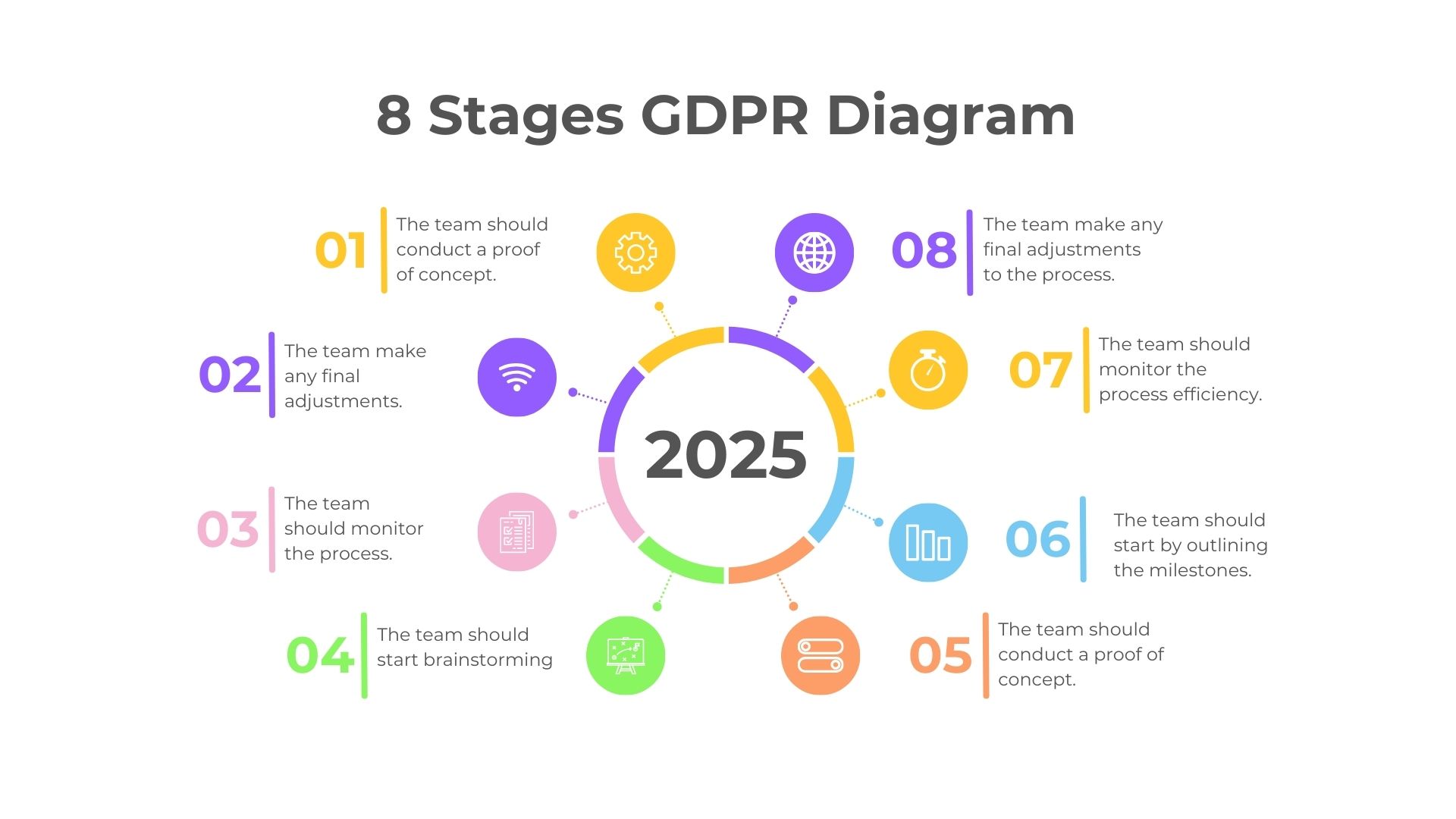
the General Data Protection Regulation (GDPR) has set a new standard for data protection and privacy across the globe. For companies operating within or targeting the European Union (EU), GDPR compliance is not just a legal obligation but a strategic necessity to protect customer data, avoid hefty fines, and maintain trust. Here’s an in-depth look at how companies can achieve and maintain GDPR compliance, with a focus on how DGVM can assist in this process:
Understanding GDPR Requirements
GDPR is built on seven key principles:
1. Lawfulness, Fairness, and Transparency: Organizations must process data in a lawful, fair, and transparent manner, ensuring data subjects are aware of how their data is being used[1][4].
2. Purpose Limitation: Data should only be collected for specified, explicit, and legitimate purposes[1][4].
3. Data Minimization: Collect only the data necessary for the stated purpose[1][4].
4. Accuracy: Ensure personal data is accurate and kept up to date[1][4].
5. Storage Limitation: Retain data only for as long as necessary[1][4].
6. Integrity and Confidentiality: Implement measures to protect data from unauthorized access, alteration, or loss[1][4].
7. Accountability: Organizations must demonstrate compliance with GDPR principles[1][4].
Steps to GDPR Compliance
1. Data Governance and Privacy Policies
– Develop Clear Policies: Establish comprehensive data handling policies that align with GDPR principles. These should cover data collection, processing, retention, and disposal[1][2][5].
– Regular Updates: Keep privacy policies current to reflect regulatory changes and ensure they are easily accessible and transparent[1][2][5].
2. Data Mapping and Inventory
– Conduct Data Mapping: Identify all personal data processed within your organization, including its sources, locations, and flows[1][2][5][6].
– Maintain a Data Inventory: Document processing purposes, lawful bases, and retention periods to support compliance efforts[1][2][5][6].
3. Security Measures
– Encryption and Pseudonymization: Protect sensitive data during storage and transmission[1][2][5][8].
– Access Controls: Implement strict role-based access to ensure only authorized personnel can access personal data[1][2][5][8].
4. Vendor and Third-Party Management
– Vet Processors: Ensure third parties processing data on your behalf meet GDPR standards[1][2][5][7].
– GDPR-Compliant Contracts: Establish contracts with vendors outlining roles, responsibilities, and breach notification procedures[1][2][5][7].
5. Appointing a Data Protection Officer (DPO)
– DPO Role: Appoint a DPO to oversee GDPR compliance, especially if your organization processes large volumes of personal data or engages in high-risk activities[1][2][5][6].
6. Consent and Data Subject Rights
– Explicit Consent: Ensure consent is freely given, specific, informed, and unambiguous[1][2][5][9].
– Data Subject Rights: Facilitate the exercise of rights like access, rectification, erasure, restriction of processing, data portability, and the right to object[1][2][5][9].
7. Data Protection Impact Assessments (DPIA)
– Conduct DPIAs: Assess high-risk data processing activities to identify and mitigate risks[1][2][5][8].
8. Incident Response and Data Breach Management
– Breach Notification: Establish protocols for notifying authorities and affected individuals within 72 hours of a breach[1][2][5][6].
– Incident Response Plan: Develop a comprehensive plan to handle data breaches effectively[1][2][5][6].
9. Employee Training and Awareness
– Regular Training: Educate employees on GDPR requirements, data protection practices, and incident reporting[1][2][5][8].
– Culture of Privacy: Foster a culture where privacy is a priority, encouraging employees to report potential issues[1][2][5][8].
10. Ongoing Compliance and Monitoring
– Regular Audits: Conduct audits to ensure compliance with GDPR principles and identify potential risks[1][2][5][8].
– Continuous Improvement: Adapt to evolving requirements and risks through continuous monitoring and improvement[1][2][5][8].
How DGVM Can Help with GDPR Compliance
1. Comprehensive Data Protection Service
DGVM offers a wide range of services to safeguard your organization’s sensitive information:
– Data Privacy Impact Assessments (DPIA): Conducting thorough assessments to identify and mitigate risks associated with data processing activities, ensuring compliance with GDPR[3].
– Data Breach Management: Developing and implementing robust data breach policies, providing guidance on handling incidents and notifying relevant authorities[3].
– Regulatory Compliance: Helping businesses stay ahead of data compliance requirements through proactive information management and risk mitigation advice[3].
2. Tailored Privacy Solutions
DGVM’s professionals are adept at designing, drafting, reviewing, implementing, and updating corporate privacy and security policies. They provide advice on various issues, including:
– privacy protection policy
– Employee telephone, internet, and email use
– Customer data processing and consents[3]
3. Incident Response and Cybersecurity
In the event of cyberattacks, DGVM provides guidance for dealing with customers, regulators, and the press, ensuring effective incident response and cybersecurity measures[3].
4. Expertise Across Disciplines
DGVM’s team includes experienced lawyers and IT experts from various disciplines, ensuring a multidisciplinary approach to address all aspects of data protection and privacy[3].
5. Strong Regulatory Links
DGVM maintains strong links with regulators, allowing for quick action when changes occur and providing valuable insights into upcoming regulatory developments[3].
6. Personalized Service
Understanding that every organization is unique, DGVM offers tailored services to meet specific needs, providing personalized and high-level assistance in data protection and privacy[3].
Conclusion
GDPR compliance is an ongoing journey that requires a strategic approach, robust policies, and a commitment to data protection. By understanding the requirements, implementing comprehensive measures, and learning from both successful compliance stories and cautionary tales, companies can not only meet GDPR standards but also enhance their data protection practices, thereby fostering trust and ensuring business continuity in an increasingly data-driven world. With DGVM’s expertise, companies can navigate this complex regulatory landscape with confidence, ensuring they are well-prepared to protect individuals’ privacy, mitigate legal risks, and conduct their operations in full compliance with GDPR.
Citations:
[1] https://www.itgovernance.eu/blog/en/summary-of-the-gdprs-10-key-requirements
[2] https://www.lepide.com/blog/gdpr-compliance-best-practices/
[3] https://www.cookieyes.com/blog/privacy-management-software-gdpr/
[5] https://nordlayer.com/learn/gdpr/best-practices-of-gdpr/
[6] https://teceze.com/gdpr-compliance-services
[7] https://gdpr.eu/checklist/
[8] https://scytale.ai/resources/best-practices-for-gdpr-compliance/
[10] https://www.pwc.ch/en/insights/fs/data-protection-global-footprint.html



